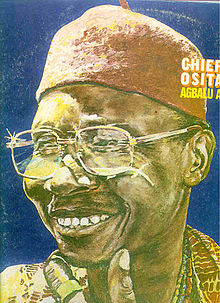- Chief Stephen Osita Osadebe
-
Chief Stephen O. Osadebe 
Background information Birth name Stephen Osita Osadebe Also known as Osadebe Born March 1936 Origin Atani, Anambra, Nigeria Died 11 May 2007 (aged 71)
St. Mary's Hospital Waterbury, Connecticut, United StatesGenres Highlife Occupations singer, songwriter, record producer Years active 1958–2007 Labels Polygram Records Nigeria Associated acts The Empire Rhythm Ochestra, Prince Nico Mbarga, Rex Lawson, Celestine Ukwu, Eddie Okonta, Victor Olaiya, Fred Coker, Victor Uwaifo Website Chief Osita at Calabash music Chief Stephen Osita Osadebe (March, 1936 — May 11, 2007),[1] often referred to as just Osadebe, was an Igbo Nigerian Highlife musician from Atani. His career spanned over 40 years, and he is one of the most well known Igbo highlife musicians. His most popular hit was the 1984 "Osondi Owendi" (Igbo: One man's meat is another man's poison.), establishing him as a leader in the highlife genre being the most popular record ever in Nigeria.[2]
Biography
In March 1936, Osadebe was born in Igbo town of Atani, in Southeastern Nigeria. He came from a line of singers and dancers in Igboland. His genre, Highlife encompassed Igbo musical elements. Along with this, calypso, samba, bolero, rumba, jazz and waltz were also present in Osadebe's musical style. It was in his high school years in Onitsha, a major commercial city near Atani, that Osadebe grew interested in music.[1]
Osadebe started his career performing at nightclubs in Lagos in the southwestern region of Nigeria. He gradually worked his way up to releasing his first album in 1958. In his career Osadebe went on to write over 500 songs; half of these songs were released commercially. He had been a part of The Empire Rhythm Orchestra, led by E. C. Arinze in which he had learned much of his music skills.[1]
As he became better established, Osadebe's style matured to include social commentary, similar to, but not as confrontational as Fela Kuti. Personal trials and tribulations was usually the main topic of his commentaries. Osadebe often extended his tracks for his audiences enjoyment, allowing room for 'people on the dance floor' to indulge in the songs.[1]
Following the Nigerian Civil War in the late 60's, the massive exodus of the eastern peoples of Nigeria (especially the Igbo) out of western Nigeria had caused the death of the Highlife's prominence in the then capital, Lagos. During the war and after the war Osadebe maintained his scheduled live performances. Juju music and later Afrobeat took precedence in Lagos, and in the 70's James Brown and various other music forms became popular in the city. In this same decade Osadebe's career had reached its zenith.[1] After turning 50 in 1986 Osadebe started to give priority to fatherhood and gave more of his time to his son Obiora and his other children from his wives. One of Osita Osadebe's last revered album's is "Kedu America".[1]
Osita Osadebe died in St. Mary's Hospital Waterbury, Connecticut on the 11 May 2007 after suffering from severe respiratory difficulties.[2]
See also
- Highlife music
- Igbo music
References
- ^ a b c d e f "Chief Stephen Osita Osadebe Passes Away On May 11, 2007". Global Rhythm Magazine News. May 15, 2007. http://worldmusic.nationalgeographic.com/view/page.basic/article/content.article/stephen_osita_obit. Retrieved 2010-04-05.
- ^ a b "Nigeria's Chief Stephen Osita Osadebe dead". United Press International. May 19, 2007. http://www.upi.com/Entertainment_News/2007/05/19/Nigerias-Chief-Stephen-Osita-Osadebe-dead/UPI-76211179591347/. Retrieved 2010-04-05.
Categories:- Igbo highlife musicians
- Igbo-language singers
- Igbo singers
- Igbo singer-songwriters
- Nigerian highlife musicians
- Nigerian male singers
- Nigerian singer-songwriters
- 1936 births
- 2007 deaths
Wikimedia Foundation. 2010.
